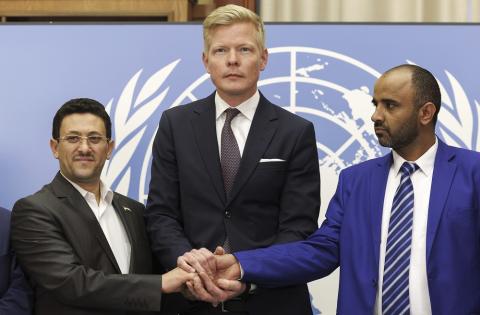
The Iran-backed Houthi militias have failed to give a final response to the proposed first phase of the redeployment plan in Hodeidah, a Yemeni military source told Asharq Al-Awsat.
They have instead intensified their military operations in Hodeidah and Dhale ahead of the arrival of United Nations envoy Martin Griffiths to Sanaa, he added.
West coast liberation operations spokesman Waddah al-Dbish told Asharq Al-Awsat that Griffiths had arrived in Houthi-held Sanaa on Sunday after the Houthis responded negatively to the redeployment plan.
The envoy was in Yemen as part of his efforts to persuade the militias to implement the first phase of the plan within ten days, he added.
The legitimate government’s representative at the regional redeployment committee (RCC), Saghir bin Aziz, had informed its head, Michael Lollesgaard, that it accepts the plan and was ready to implement it, he revealed.
The Houthis have until May 15 to withdraw from Hodeidah as part of the proposal.
The government forces will not wait forever for the Houthis to fulfill their commitments to the plan, warned bin Aziz, according to Dbish.
The Houthis have instead chosen to escalate their actions on the ground, he continued. The government forces have thwarted a militia advance in a mountainous region south of Hodeidah. More than 18 militants were killed in the operation.
Separately, the UN regained access to donated grain stored in Hodeidah on Sunday and began the task of salvaging food that could stave off starvation for millions of citizens before it rots.
World Food Program (WFP) grain stores there have been cut off for eight months, putting 51,000 tonnes of wheat at risk of rotting.
A WFP technical team arrived in the eastern outskirts of Hodeidah on Sunday to begin cleaning and servicing equipment in preparation for milling grain, a WFP spokesman told Reuters.
Sources familiar with the matter said the WFP-led team traveled from the government-held southern port city of Aden along the western coast, avoiding Houthi-controlled areas after the group denied them access from the north, which it controls.
WFP spokesman Herve Verhoosel said its priority was to begin cleaning and servicing milling machinery and fumigating the wheat.
The UN expects that process to take several weeks before starting to mill it into flour and distributing it to the Yemeni communities most in need.












